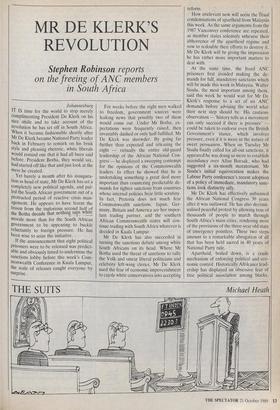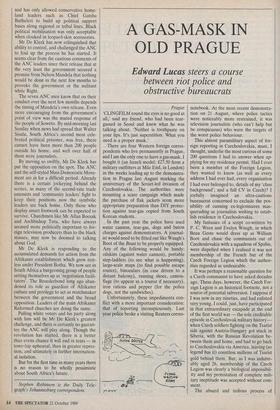MR DE KLERK'S REVOLUTION
Stephen Robinson reports
on the freeing of ANC members in South Africa
Johannesburg IT IS time for the world to stop merely complimenting President De Klerk on his nice smile and to take account of the revolution he has set off in South Africa. When it became fashionable shortly after Mr De Klerk became National Party leader back in February to remark on his brisk style and pleasing rhetoric, white liberals would remind one that it had all been said before. President Botha, they would say, had started off like that and just look at the mess he created.
Yet barely a month after his inaugura- tion as head of state, Mr De Klerk has set a completely new political agenda, and pul- led the South African government out of a protracted period of reactive crisis man- agement. He appears to have learnt the lesson from the inglorious second half of the Botha decade that nothing saps white morale more than for the South African government to be appearing to buckle reluctantly to foreign pressure. He has been wise to seize the initiative.
If the announcement that eight political prisoners were to be released was predict- able and obviously timed to undermine the sanctions lobby before this week's Com- monwealth Conference in Kuala Lumpur, the scale of releases caught everyone by surprise. For weeks before the eight men walked to freedom, government sources were leaking news that possibly two of them would come out. Under Mr Botha, ex- pectations were frequently raised, then invariably dashed or only half-fulfilled. Mr De Klerk was shrewder. By going far further than expected and releasing the eight — virtually the entire old-guard leadership of the African National Con- gress — he displayed a sweeping contempt for the opinions of the Commonwealth leaders. In effect he showed that he is undertaking something a great deal more important than countering predictable de- mands for tighter sanctions from countries whose internal policies bear little scrutiny. In fact, Pretoria does not much fear Commonwealth sanctions. Japan, Ger- many, Britain and America are her impor- tant trading partner, and the southern African Commonwealth states will con- tinue trading with South Africa whatever is decided in Kuala Lumpur.
Mr De Klerk has also succeeded in turning the sanctions debate among white South Africans on its head. Where Mr Botha used the threat of sanctions to rally the Volk and smear liberal politicians and celebrity left-wing clerics, Mr De Klerk used the fear of economic impoverishment to cajole white conservatives into accepting reform.
How irrelevant now will seem the ritual condemnations of apartheid from Malaysia this week. As the same arguments from the 1987 Vancouver conference are repeated, as member states solemnly rehearse their abhorrence of the apartheid regime and vow to redouble their efforts to destroy it, Mr De Klerk will be giving the impression he has rather more important matters to deal with.
At the same time, the freed ANC prisoners first avoided making the de- mands for full, mandatory sanctions which will be made this week in Malaysia. Walter Sisulu, the most important among them, said this week he would wait for Mr De Klerk's response to a set of six ANC demands before advising the world what their next step should be. His cautious observation — 'history tells us a movement can only succeed if there is pressure' could be taken to endorse even the British Government's stance, which involves pressure, even if it is more in the nature of sweet persuasion. When on Tuesday Mr Sisulu finally called for all-out sanctions, it appeared he was doing so more to establish ascendancy over Allan Boesak, who had suggested a six-month moratorium. Mr Sisulu's initial equivocation makes the Labour Party conference's recent adoption of a policy of immediate, mandatory sanc- tions look distinctly silly.
Mr De Klerk has effectively unbanned the African National congress 30 years after it was outlawed. He has also decrimi- nalised peaceful protest by allowing tens of thousands of people to march through South Africa's main cities, rendering most of the provisions of the three-year old state of emergency pointless. These two steps amount to a remarkable abrogation of all that has been held sacred in 40 years of National Party rule.
Apartheid, boiled down, is a crude mechanism of enforcing political and eco- nomic control. Historically Afrikaner lead- ership has displayed an obsessive fear of free political association among blacks, and has only allowed conservative home- land leaders such as Chief Gatsha Buthelezi to build up political support bases along regional or tribal lines. Black political mobilisation was only acceptable when cloaked in leopard-skin accessories.
Mr De Klerk has now relinquished that ability to control, and challenged the ANC to foul up the process he has started. It seems clear from the cautious comments of the ANC leaders since their release that at the very least the government secured a promise from Nelson Mandela that nothing would be done in the next few months to provoke the government or the militant white Right.
The seven ANC men know that on their conduct over the next few months depends the timing of Mandela's own release. Even more encouraging from the government's point of view was the muted response of the people of Soweto. By mid-morning last Sunday when news had spread that Walter Sisulu, South Africa's second most cele- brated political prisoner, was free, there cannot have been more than 200 people outside his home, and well over half of them were journalists.
By moving so swiftly, Mr De Klerk has put the opposition on the spot. The ANC and the self-styled Mass Democratic Move- ment are in for a difficult period. Already there is a certain jockeying behind the scenes, as many of the second-rate trade unionists and 'community leaders' fight to keep their positions now the symbolic leaders are back home. Only those who display smart footwork can be expected to survive. Churchmen like Mr Allan Boesak and Archbishop Tutu, who have always seemed more politically important to for- eign television producers than to the black masses, may now be doomed to talking about God.
Mr De Klerk is responding to the accumulated demands for action from the Afrikaner establishment which grew rest- less under President Botha. We now see in South Africa a burgeoning group of people setting themselves up as 'negotiation facili- tators'. The Broederbond long ago aban- doned its role as guardian of Afrikaner culture and privilege to act as matchmaker between the government and the broad opposition. Leaders of the main Afrikaner Reformed churches are doing the same.
Pulling white voters and his party along with him will be Mr De Klerk's greatest challenge, and there is certainly no guaran- tee the ANC will play along. Though the revolution has started, there is a better than evens chance it will end in tears — in township upheaval, then in greater repres- sion, and ultimately in further internation- al isolation.
But for the first time in many years there is no reason to be wholly pessimistic about South Africa's future.
Stephen Robinson is the Daily Tele- graph's Johannesburg correspondent.



























































 Previous page
Previous page